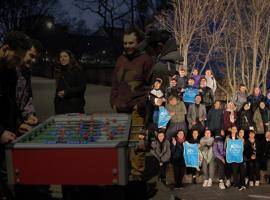Tonite Journal 1: the first year of the project

In the first journal of Tonite, Valeria Ferraris UIA Expert reports on the progress made in the first year of implementation,
Executive summary
This report analyses the first period (September 2019 – December 2020) of Tonite project in Turin, one of the three projects selected under the new UIA domain of security. Security is a challenge for cities and a topic that moves up and down the priority list of the political agenda of cities and governments.
Tonite aims to improve the night-time security perception of public spaces in two areas of the city of Turin. It promotes an inclusive concept of security connected with the quality of life and the liveability of the city.
First, the report presents the European policy context in which Tonite project has been inserted. Security is a priority in the EU agenda and a relatively new topic for the Urban Agenda. As Tonite project focuses on security perception in public spaces, the new Thematic Partnership on security in public spaces is particularly relevant.
Then, the project Tonite and the partnership involved in the project are briefly outlined. The two core sections discuss the steps taken so far by the project and the implementation challenges. In 2020, the project created the conditions to carry out all foreseen activities and tackle all emerging challenges. To be successful the project needs organisational innovations within the public administration to make the urban data platform a viable tool for the daily work of public officers and a new relation between citizens and administration.
Therefore, special attention needs to be devoted to cross-department working and to the participative approach towards co-implementation, keeping in mind that the Tonite approach aims to implement something more than mere participation.
Implementation challenges
Leadership
The leadership of the city of Turin is a collaborative leadership that strongly involved the delivery partners in taking responsibility. The leadership of the Municipality is based on accurate project management and the effort to involve more departments of the city of Turin (see cross-department working challenge). Political leaders view the Tonite project as appropriate and support it. The results of the 2021 municipal elections should not impact the project due to the well-established governance of the project. The city of Turin has the clear intention to spread the ideas and goals of the Tonite project at the local, national and international level. Covid-19 has partially postponed mutual learning events with other UIA projects and the participation in events.
Public procurement
Public procurement is a crucial issue in the project. The tender for projects and services will test innovative solutions of dissemination of the tender and of administrative and content support for potential participants. Even before the launch, a public event designed to stimulate creativity has been organised to engage local communities and stimulate tender participation.
While being a more traditional open tender procedure, the urban regeneration tender is based on an agreement with the University of Turin to guarantee that the renovation of public spaces will be accompanied by university services extended in the evening time. One event to collect insights for the urban regeneration tender was organised.
The city of Turin website dedicated to the tender process should be significantly improved to increase the visibility and transparency of this innovation.
Cross-department working
The project is led by the UE funds and Innovation Department of the city of Turin. However, the success of the projects requires the active involvement of many departments. These include the Youth and Urban Regeneration Department, which is directly involved in the urban regeneration intervention, the Mobility Department; the Environment and Public Green Department; and the Urban Planning Department. In July, an inter-departmental working group was established which held the first meeting in September 2020. Cooperation among departments is required to provide data for the urban digital platform, and the use of the platform should become part of the working routine of the city departments. The role played by the municipal police department is also crucial, even though it is still not clearly established.
Participative approach for co-implementation
The active involvement of local stakeholders, citizens, informal groups, and non-profit organisations is a cross-cutting and distinguished feature of the Tonite project. The idea that citizens enjoy an active dialogue with the public administration and contribute to the decision-making requires a constant level of engagement. Many partners have shown expertise in citizen engagement and this should strongly support the participative approach in co-implementation. The smartphone application Telling Stone is the cornerstone measure to create and maintain the needed level of engagement. In addition, even in the development of the digital platform, citizens are involved as data producers thanks to the Telling Stone application. Sustaining the active involvement of citizens could represent a significant challenge.
Monitoring and evaluation
Monitoring and evaluation are perceived as major challenges in the project due to the objective difficulties in measuring the impact on the perception of insecurity and difficulties in controlling intervening variables. Significant effort has been placed in building a monitoring and evaluation model. The model measures the impacts of 1) citizens’ perception of insecurity 2) cross-department collaboration 3) projects, services and urban regeneration of the target areas.
Communication with target beneficiaries and users
Communication activities are accurately planned and show an integrated model between social media and more traditional media outlets. Storytelling also is a distinguished feature of the project. This integrated model seems to be the best solution for a project strongly characterized by a participative approach in delivering actions. The involvement of the Anci and Efus should also guarantee communication at a broader level.
Upscaling
The project is rooted in specific areas of the city of Turin and deals with an unstable object as the perception of insecurity. Dissemination to a wider audience should be easier to achieve thanks to Anci and Efus, which helps the upscaling process. Mainstreaming the Tonite approach towards other city areas or other cities requires accurate reflection to choose which direction should be taken. Due to the features of the areas involved, the mainstream towards other cities appears as the desirable direction. The reflection is far from being within the project agenda.



 Urban security
Urban security














